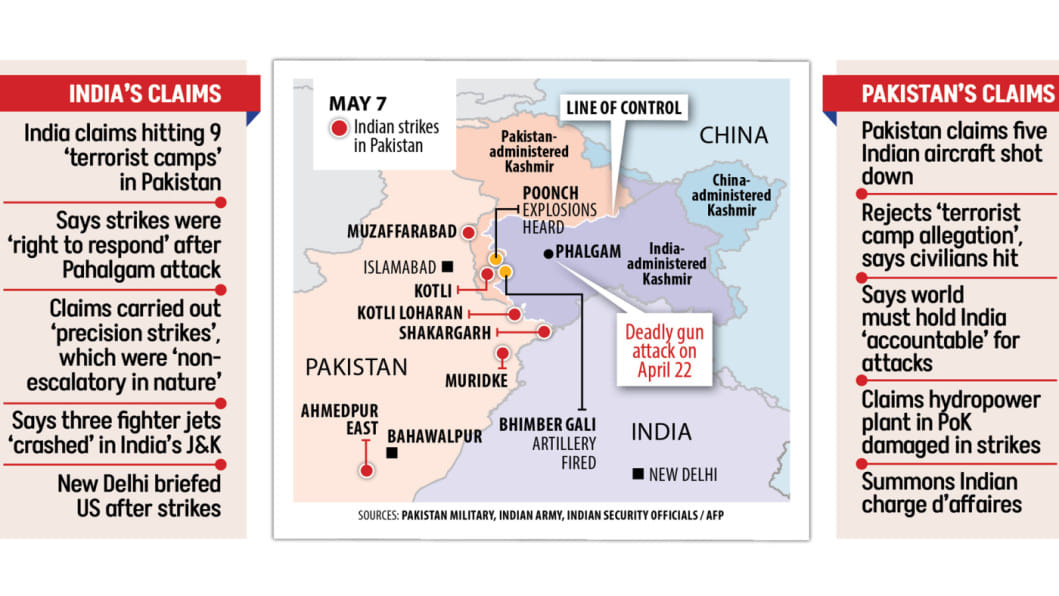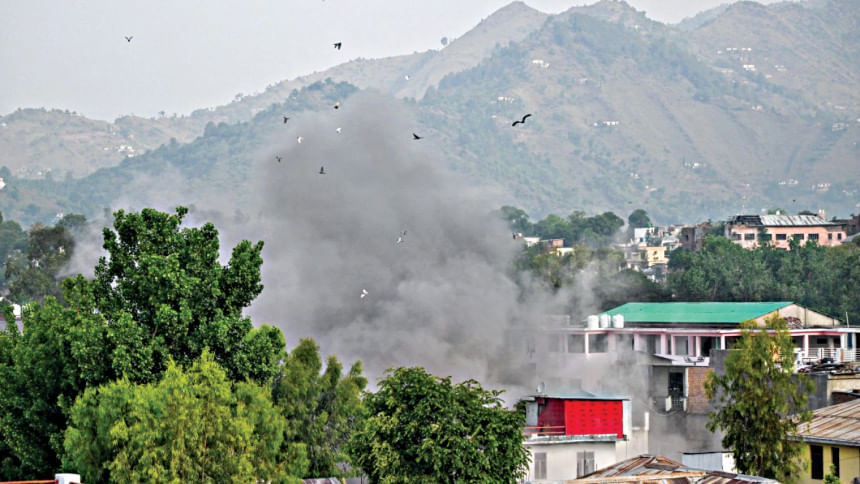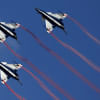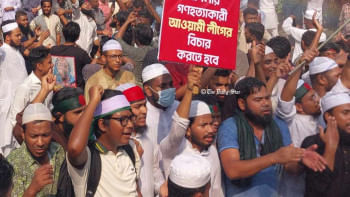World urges calm as India strikes Pakistan

India and Pakistan exchanged war of words and also heavy artillery fire along their contested frontier yesterday, hours after New Delhi launched deadly missile strikes on its arch-rival.
The worst violence between the nuclear-armed neighbours in two decades sparked alarm and calls for restraint from around the world.
At least 43 deaths were reported, with Islamabad saying 31 civilians were killed by the Indian strikes and firing along the border, and New Delhi adding at least 12 dead from Pakistani shelling. Dozens were also injured in both countries.
The Indian army said "justice is served", reporting nine "terrorist camps" had been destroyed, with Delhi adding that its actions "have been focused, measured and non-escalatory in nature".
Pakistan Defence Minister Khawaja Muhammad Asif refuted the claims, saying civilian areas were attacked.

He accused Indian Prime Minister Narendra Modi of launching the strikes to "shore up" his domestic popularity, adding that Islamabad "won't take long to settle the score".
Later, in an interview with GEO TV, he said Pakistan will retaliate and will only hit military targets, not civilians.
Late last night, Prime Minister Shehbaz Sharif, in a televised address to the nation, said India "will have to suffer the consequences" of its air strikes.
Shehbaz said that it "took only a few hours" for the Pakistani military to bring the enemy to its knees.
He also claimed that the Pakistani military shot down five Indian jets and once again "proved their superiority over the enemy in conventional warfare".
He also vowed to avenge "every drop of blood" spilt in the Indian air strikes early yesterday.
Pakistan's DG ISPR said that the National Security Committee authorised the country's armed forces to respond to Indian aggression at "time and manner" of their choosing.
"In consonance with article 51 of the UN charter, Pakistan reserves the right to respond, in self defence, at a time, place, and manner of its choosing to avenge the loss of innocent Pakistani lives and blatant violation of its sovereignty," said the DG, quoting a statement issued after the NSC meet.
The South Asian neighbours have fought multiple wars over the divided territory since they were carved out of the subcontinent at the end of British rule in 1947.
Pakistan military sources said they succeeded in shooting down five jets, including three Rafales, without crossing into the Indian airspace.
An Indian senior security source, who asked not to be named, said three of its fighter jets had crashed on home territory.
However, the Indian embassy in Beijing called reports of fighter jets downed by Pakistan "disinformation".

At a media briefing in Delhi, India's Foreign Secretary Vikram Misri detailed India's rationale for the attack.
Misri said the Pahalgam terror attack on April 22 that claimed 26 lives aimed to "undermine normalcy returning to Kashmir," making a firm response imperative.
"Our intelligence indicated that further attacks against India are impending. Thus, compulsion, both to deter and prevent and hence earlier this morning, India exercised its right to respond to deter such more cross-border terrorism," he said.
Misri also briefed 13 foreign envoys in New Delhi on the strikes, an Indian source familiar with the developments said.
"India made it clear that if Pakistan responds, India will respond," a source who attended the meeting said.
The largest Indian strike was on an Islamic seminary near the Punjabi city of Bahawalpur, killing 13 people according to the Pakistan military.
A government health and education complex in Muridke, 30 kilometres from Lahore, was blown apart, along with a mosque in Muzaffarabad -- the main city of Pakistan-administered Kashmir -- killing its caretaker.
Four children were among those killed in yesterday's attacks, according to the Pakistan military.
Pakistan also said a hydropower plant in Kashmir was targeted by India, damaging a dam structure, after India threatened to stop the flow of water on its side of the border.
India's Defence Minister Rajnath Singh said the overnight operation was New Delhi's "right to respond" following the Pahalgam attack.
"The targets we had chosen were destroyed with great precision and sensitivity, ensuring that no civilian population or area was affected," Singh told reporters in New Delhi.
"We only targeted terror camps, exercising our right to respond to the attack on our soil."
Pakistan had denied any involvement in the Pahalgam assault and called for an independent probe.
India said it hit militant groups Jaish-e-Mohammed and Lashkar-e-Taiba. Jaish later said 10 relatives of its leader Masood Azhar -- who was released from an Indian jail in 1999 in exchange for 155 hostages from a hijacked Indian Airlines plane - were killed, with no mention of the fate of Azhar himself.
Meanwhile, Modi yesterday briefed Indian President Droupadi Murmu about the cross-border operation.
India has called for an all-party meeting today to brief them about the military strikes in Pakistan and Pakistan-Occupied Kashmir, according to Parliamentary Affairs Minister Kiren Riiiju.
Meanwhile, Pakistan's National Security Committee called on the international community to hold India "accountable" for the violation of its sovereignty.
The neighbours also exchanged intense shelling and heavy gunfire across the "line of control", their de facto border in Kashmir, officials there said.
In Muzaffarabad, United Nations military observers arrived to inspect a mosque that Islamabad said was struck by India.
"There were terrible sounds during the night, there was panic among everyone," said Muhammad Salman, who lives close to the mosque.
"We are moving to a safer place... we are homeless now," added 24-year-old Tariq Mir, who was hit in the leg by shrapnel.
In Indian-held Kashmir, residents fled in panic from the Pakistani shelling.
"There was firing from Pakistan, which damaged the houses and injured many," said Wasim Ahmed, 29, from Salamabad village.
"They were taken to hospitals in Uri and Baramulla towns. There has been extensive damage here, everything is destroyed, and people are fleeing the area."
India had been widely expected to respond militarily to the Pahalgam attack, which it blamed on Pakistan-based group Lashkar-e-Taiba, a UN-designated terrorist organisation.
The two nations have traded days of threats and tit-for-tat diplomatic measures, while Pakistan has conducted two missile tests.
"Escalation between India and Pakistan has already reached a larger scale than during the last major crisis in 2019, with potentially dire consequences", International Crisis Group analyst Praveen Donthi said.
Diplomats have piled pressure on leaders to step back.
"The world cannot afford a military confrontation between India and Pakistan," the spokesman for UN chief Antonio Guterres, Stephane Dujarric, said in a statement.
US President Donald Trump told reporters in Washington he hoped that the fighting "ends very quickly".
"I want to see it stop. And if I can do anything to help, I will be there," he told reporters in the Oval Office.
Concern poured in, including from China -- a mutual neighbour of both nations -- as well as from the EU, Britain, France, Russia, Germany and Turkey, while airlines have cancelled, diverted or rerouted flights.
Iranian Foreign Minister Abbas Araghchi was expected in New Delhi yesterday, two days after a visit to Islamabad, as Tehran seeks to mediate.
EU's foreign policy chief Kaja Kallas said the India-Pakistan situation is very concerning, adding that the EU was trying to mediate the crisis.
China's foreign ministry called on "both India and Pakistan to prioritise peace and stability, remain calm and restrained and avoid taking actions that further complicate the situation".
Russia's foreign ministry called on the parties to exercise restraint to prevent further "deterioration".
Turkish President Tayyip Erdogan talked with Shehbaz Sharif to convey his solidarity.
During the call, Erdogan told Sharif that Turkey supported what he called Pakistan's "calm and restrained policies" in the crisis, his office said in a statement.

 For all latest news, follow The Daily Star's Google News channel.
For all latest news, follow The Daily Star's Google News channel. 







Comments